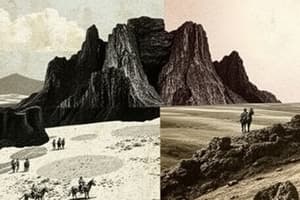Podcast
Questions and Answers
How did the Egyptians treat the children of Israel as they multiplied?
How did the Egyptians treat the children of Israel as they multiplied?
- They ignored them
- They became allies
- They greatly abhorred them (correct)
- They welcomed them
What type of labor did the Egyptians force upon the Israelites?
What type of labor did the Egyptians force upon the Israelites?
- Light fieldwork
- Building houses
- Hard labor with mortar, brick, and service in the field (correct)
- Crafting jewelry
What were the names of the two Hebrew midwives mentioned in the passage?
What were the names of the two Hebrew midwives mentioned in the passage?
- Shiphrah and Puah (correct)
- Puah and Miriam
- Shiphrah and Jochebed
- Deborah and Puah
What command did the king of Egypt give to the Hebrew midwives regarding the newborns?
What command did the king of Egypt give to the Hebrew midwives regarding the newborns?
Why did the midwives refuse to follow the Pharaoh's command?
Why did the midwives refuse to follow the Pharaoh's command?
What reason did the midwives give to Pharaoh for not killing the male babies?
What reason did the midwives give to Pharaoh for not killing the male babies?
What reason did the midwives give Pharaoh for not killing the male children?
What reason did the midwives give Pharaoh for not killing the male children?
How did God reward the midwives for their actions?
How did God reward the midwives for their actions?
What did Pharaoh command after the midwives saved the male children?
What did Pharaoh command after the midwives saved the male children?
What did Pharaoh decide to do with the female Hebrew babies?
What did Pharaoh decide to do with the female Hebrew babies?
What was the result of the midwives' actions concerning the population of the Hebrews?
What was the result of the midwives' actions concerning the population of the Hebrews?
From which house did the man and his wife come?
From which house did the man and his wife come?
What did the mother do after giving birth to her son?
What did the mother do after giving birth to her son?
When the mother could no longer hide her child, what did she do?
When the mother could no longer hide her child, what did she do?
Who was watching the child from a distance as he was placed in the river?
Who was watching the child from a distance as he was placed in the river?
Flashcards are hidden until you start studying
Study Notes
The Israelites in Egypt
- The Israelites increased in number, but the Egyptians abhorred them.
- The Egyptians forced the Israelites into hard labor, building with mortar and bricks.
- The king of Egypt commanded Hebrew midwives to kill all newborn male Israelites.
- The midwives, Shiphrah and Puah, feared God and disobeyed by saving the baby boys.
- They told Pharaoh the Hebrew women were too quick and gave birth before the midwives arrived.
- God rewarded the midwives by providing for them.
- Pharaoh commanded all Hebrew baby boys be thrown into the Nile River.
The Birth of Moses
- A man and his wife, from the tribe of Levi, had a son.
- The mother hid the baby for three months.
- When unable to hide him further, she placed him in a basket of bulrushes and sent him down the Nile River.
- His sister watched from a distance.
- Pharaoh's daughter found the baby.
- Pharaoh's daughter named the baby Moses.
Studying That Suits You
Use AI to generate personalized quizzes and flashcards to suit your learning preferences.


